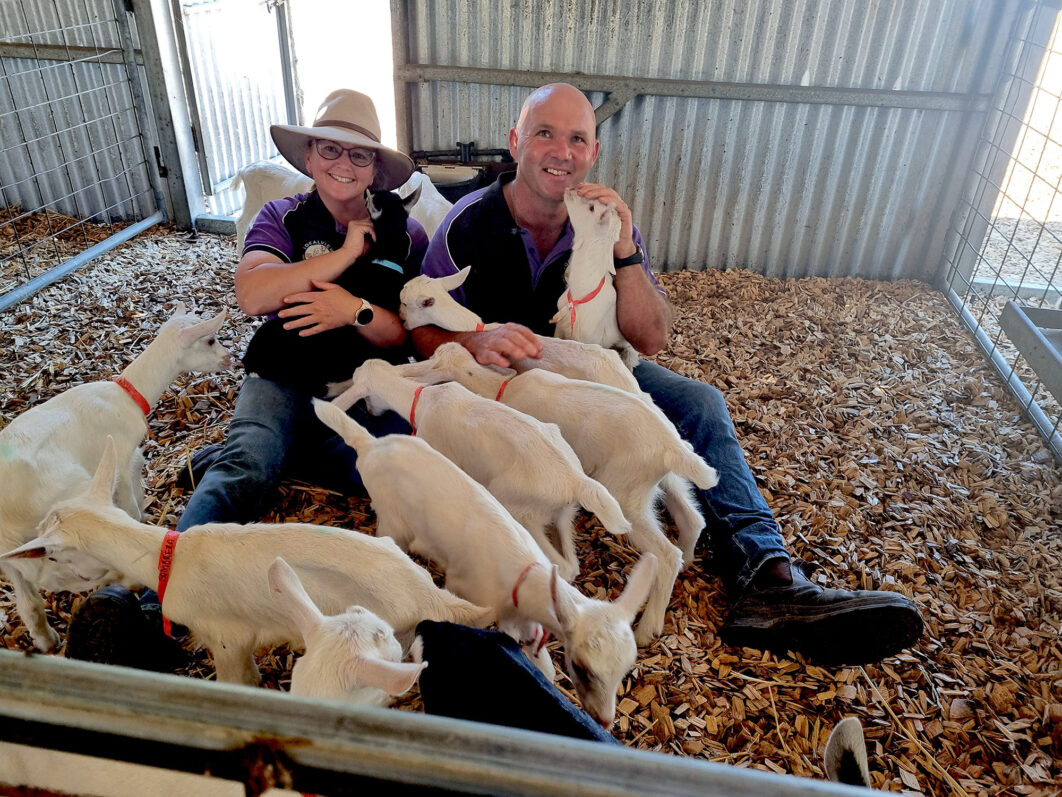Idealview Dairy, a stud goat dairy based on a 565-acre property near Meningie, was a recipient of a commendation certificate at the 2021 Australian Biosecurity Awards.
Owners Bec and John Falkenhagen are passionate about keeping their herd ‘clean and healthy’ and say biosecurity should be a priority for every farmer.
“When we started up, we wanted to have a disease-free herd and unfortunately, we had an incursion,” John said.
“We had one doe get through to the herd with Caprine Arthritis Encephalitis (CAE), a serious disease that causes major production losses in goats through chronic mastitis, arthritis and pneumonia.
“That one turned to 10 very quickly, then that 10 turned to 20 even quicker. We made the decision to eradicate the disease. That meant splitting the herd, hand-feeding all the kids, and a lot of sleepless nights. When a goat has CAE, their kids can’t drink from them.”
John and Bec helped a supplier to develop a substitute colostrum for goats, to assist with kid health during hand feeding.
It took Idealview three years and $300,000 to completely eradicate the disease.
“Following this experience, we helped to develop the Large Herd Eradication Program and we’ve helped other farmers to put the program in place on their farms,” John said.
“We’ve never hidden the fact that we had an incursion. We’ve been very public that we had it and that we don’t have it anymore. We are now recognised as disease free and can export goats anywhere in the world.”
As part of their work to recover from CAE, Idealview has developed a robust biosecurity program for the business.
“It’s not just about any one disease, it’s about preventing all of the pests, diseases and weeds that could cause production losses. We know that if we had a significant incursion, it would cost us a million dollars,” John said.
“That’s how important it is. And it annoys me when people don’t take it seriously.”
When visitors and suppliers come to the farm, they are asked to come in clean clothes and shoes.
“If they haven’t got clean shoes, then we give them boot covers to wear. And if they haven’t got clean clothes, they get overalls,” Bec said.
“We don’t allow any other vehicles onto our farm. If a supplier needs to come into the farm, we drive them in our vehicles. And our own drivers have farm boots that they change into when they enter the property, which don’t leave the farm.
“If people get cranky, we turn it around and say, you don’t have anything on your property, that’s fine. But what if we did and we didn’t know? You don’t want to take it home either. You should wear the shoe covers and overalls for your own farm’s protection.”
Bec said while strict biosecurity protocols were important for reducing financial risk, they were also important for animal health. “For us, having a clean herd is how we want to run our animals. We don’t want to see them suffer from anything. We want healthy animals,” she said.
As part of Idealview’s biosecurity program, they closed their herd three years ago.
“A closed herd means that we don’t run the risk of importing a disease into our herd. When we established the herd, we brought in enough genetic diversity to last us a lifetime, so we’re happy,” John said.
Bec and John milk Saanen, Toggenburg and British Alpines across about 600 lactations a year and batch kids every eight weeks.
Currently, all Idealview’s milk goes to Meredith Dairy in Victoria and is made into cheese and yoghurt that’s sold in Australia and in a range of export markets including the US.
Due to the low volume of milk produced by goats, Idealview drives milk to Meredith themselves every two days, with milk transported in insulated vats on the back of a truck.
“We do a lot of kilometres every year. It’s a bit of an inconvenience driving back and forth, but it’s well worth it,” Bec said.
“People can only work 40 hours a week and by the time you’ve got 14 milking shifts, 14 feeding shifts and you have a truck run every second day, we need eight staff including us to make it work.
“We also want to ensure staff have good work-life balance and that they don’t work crazy hours. That’s important for staff retention and productivity, which is important for our business sustainability.”
